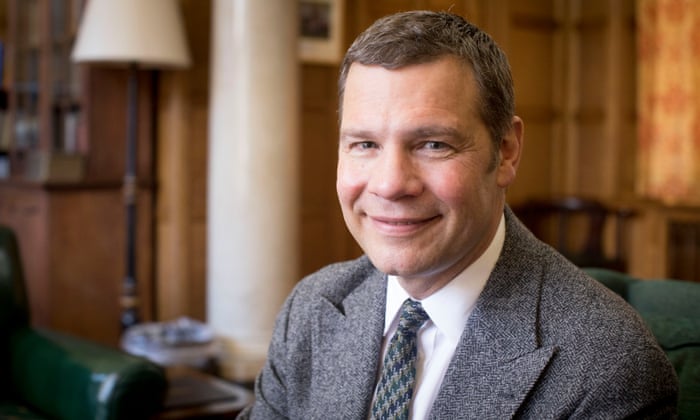
Charles Conn, the warden of the Rhodes Trust: ‘We don’t think it’s our business to make apologies for Cecil Rhodes as a person. Our job is to support the scholarships.’ Photograph: Alicia Canter for the Guardian
The Rhodes scholarship – the oldest and most prestigious international graduate award – is to be opened to applicants from Britain and the rest of the world for the first time, the Rhodes Trust is to announce.
From their foundation more than 100 years ago, funded by a massive bequest from the imperialist tycoon Cecil Rhodes, eligibility for the scholarships has been confined largely to residents of a narrow group of countries, with most coming from the US, Canada, South Africa and Australia.
From next year, high-achieving graduates from the UK and other countries without dedicated Rhodes programmes will be able to follow in the footsteps of Bill Clinton, Rachel Maddow and a string of prime ministers, Nobel prize-winners and other political, academic and media leaders.
Charles Conn, the warden of Rhodes House in Oxford, which administers the programme, said initially two scholarships each year would be made available for international applicants as part of the trust’s drive to open the scholarship far beyond Cecil Rhodes’ original boundaries.
“In the last five years we’ve thought: how can we take this great old institution and bring it into the 21st century? And one of the most obvious things is, why is the scholarship only tenable if you’re in a former Commonwealth country, plus the US and Germany?” said Conn.
“We’re looking for people to fight the world’s fights, who we hope will change the world for the better. They might just as easily come from Indonesia or Brazil, or Birmingham.”
The man behind the scholarship remains a highly controversial figure. In recent years, Cecil Rhodes’ statue at his former Oxford college Oriel has attracted protests, inspired by the Rhodes Must Fall campaign in South Africa, where his legacy is as a colonial politician who oversaw proto-apartheid legislation and used military power to expand Britain’s empire.
The Guardian’s obituary of Rhodes in 1902 damned him as unscrupulous and “a wrecker instead of a constructor of South African development”.
Rhodes’ wealth derived from his success as a businessman in operating the diamond mines that grew to become the De Beers group. It was this fortune that he bequeathed to fund the scholarships at Oxford University that still bear his name. The Rhodes Trust holds about £300m in investments.
Conn said the purpose of the programme’s latest expansion was not to burnish Rhodes’ name. “We are a forward-looking organisation. Our purpose is to find and help develop these incredible young people to change the world. We don’t think it’s our business to make apologies for Cecil Rhodes as a person, it’s not required. Our job is to support the scholarships,” he said.
“We believe people should examine the legacies of all historic actors, Rhodes included. If you are a Rhodes scholar you might want to ask yourself, does your benefiting from this money put an extra duty on you to do good in the world? Each of us interprets that in a different way.”
While Rhodes’ bequest stipulated that only men could be Rhodes scholars, that bar was dropped in 1976. More recently, scholarships have been added to include residents of China, 18 countries in west Africa, Malaysia, Palestine and Israel.
“It’s a pretty slow process, to raise the money country by country. We realised that if we could offer scholarships that were open to anybody, then we might win a foothold in the rest of the world more quickly,” said Conn, who steps down next year to be succeeded by the trust’s first female warden, Elizabeth Kiss.
As well as the UK, the new scholarships will embrace candidates from Central and South America, north Africa, and Europe, where only Germany has a programme.
Global competition for the new scholarships is likely to be intense, but Conn warned that the programme’s standards mean that only a select few recent graduates were likely to be contenders.
“You have to have an incredibly high academic standard, so if you are starting out your undergraduate work then you’ll have to work your tail off because the competition is very high. You want to make sure that there’s something you care about, including caring for other people, and you definitely have to be doing something non-academic at a very high level. You don’t have to be a cricket captain, you could be an aspiring conductor.
“And then you want to demonstrate leadership. But it’s pretty hard to fake. We do get applications every year from people who tack some stuff on to their résumé. We’re pretty good at sniffing them out.”
Those who make it through the scholarship’s rigorous process will be awarded an initial two years of postgraduate funding and generous living allowances, with an option for a third year.
[“Source-theguardian”]
